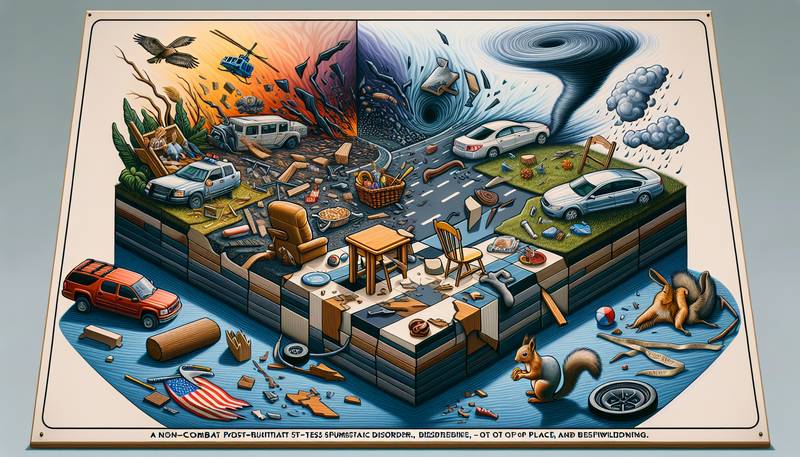Everything you Need to Know about Non-Combat PTSD Claimssubmitted on 12 January 2026

Understanding Non-Combat PTSDPTSD, or Post-Traumatic Stress Disorder, is like that unexpected piece of furniture you find while shopping—it can come without a manual, often seems out of place, and you're really not sure how it ended up in your life. While many associate PTSD with combat experiences, it's important to recognize that it can also emerge from non-combat incidents, ranging from car accidents to experiencing natural disasters, or even witnessing a squirrel stealing someone's lunch. Simply put, trauma can sneak in during a variety of life events. The impact of these non-combat experiences can be profound, leading to challenges that may not be visible on the surface. For those navigating the often murky waters of PTSD claims, understanding the nuances is crucial. After all, if you're going to sail the sea of bureaucracy, it helps to have a map—and maybe a snack or two.Identifying SymptomsRecognizing the symptoms of non-combat PTSD is vital to understanding its effects. Symptoms can vary widely, sometimes more like a buffet of emotions than a set meal. They include: - Flashbacks or intrusive thoughts reminiscent of that time you thought you could handle a double espresso.
- Heightened anxiety or a constant sense of impending doom, akin to waking up to a world where cats are actually in charge.
- Avoidance of places or people that remind you of the traumatic event, much like avoiding that coffee shop where you once spilled a grande mocha on your favorite shirt.
- Negative changes in mood or thoughts; the kind that makes you feel like you had a bad match with an overly sour lemon.
- Physical symptoms such as headaches or stomach problems, which could make you a prime candidate for a sitcom episode.
Understanding these symptoms can help individuals take steps toward recovery, transforming what feels like an uninvited guest into a less disruptive roommate.Navigating the Claims ProcessWhen it comes to making a claim for non-combat PTSD, be prepared for a journey that could rival an epic novel—complete with plot twists, bureaucratic cliffhangers, and maybe even a few dragons (metaphorical, of course). The first step is to gather documentation, including medical examinations, psychological evaluations, and any relevant incident reports. You might wish to keep your sense of humor handy, as dealing with forms can feel like deciphering ancient scripts. Consider enlisting the help of a veteran service officer or legal expert who understands the process. They’re like the wise wizards of the bureaucracy, guiding you through the labyrinthine paths of paperwork.Though it may feel daunting, remember that each step taken is a move closer to relief. And if you happen to encounter an overly helpful automated phone system, there’s no shame in pretending to be a robot yourself until you get to a live person.Common MisconceptionsThe world of PTSD claims is rife with misconceptions. One common myth is that non-combat PTSD isn’t “real” PTSD. This outlook is as outdated as dial-up internet. Non-combat experiences can have just as significant an impact on a person’s life, regardless of the source. Another prevalent notion is that only veterans are eligible for benefits. While veterans do have specific avenues for their claims, civilians can also pursue non-combat PTSD claims through various channels such as employer, private insurance, or public assistance programs. It turns out that being traumatized by a workplace incident is just as valid—a fact that can leave your boss looking like they just stepped on a nail.Moving Towards HealingHealing from non-combat PTSD takes time, much like trying to train a cat to fetch. Therapy, support groups, and medication are all valuable tools in the healing arsenal. Each step, no matter how small, counts.Take a moment to explore various therapeutic options, including Cognitive Behavioral Therapy (CBT), which can help reshape negative thought patterns. Remember, even the most resilient among us sometimes need a little help. And if you encounter an awkward therapist moment, simply chalk it up to part of the experience—the same way you might react to a cat that decides your lap is the perfect place for a nap right when you’re trying to work.Feline Good About the FutureWhile navigating non-combat PTSD claims can feel like a marathon, it is essential to maintain hope and actively seek help. The road to recovery is not linear, and that’s perfectly okay. Each individual’s experience is unique, and what works for one may not work for another.As you embark on this journey, remember to be gentle with yourself. Finding the right support can lead to healing, and who knows? You may emerge with newfound strength, skills, and maybe even a funny story or two about your adventures in the vast land of paperwork and claims. After all, a little laughter can be the best medicine—provided it’s not a side effect of your medication!
|







